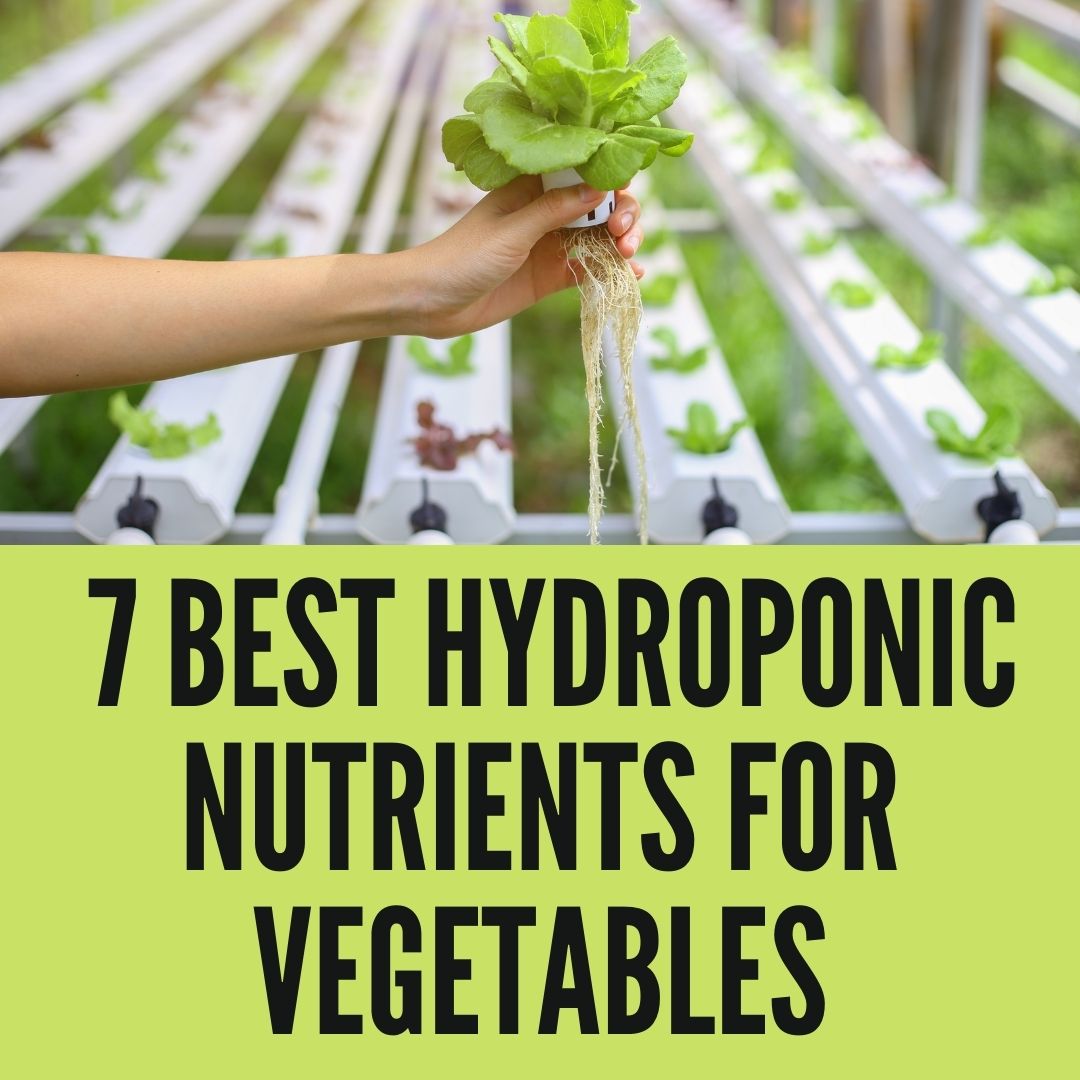Hydroponics is a form of horticulture. Using this method you don’t need to use soil to grow your plants. Instead, you’ll have to mineral nutrient solution in a watery medium. It’s a unique technique to skip the use of soil in farming.
Growing plants hydroponically can be difficult, but it doesn’t have to be all that difficult! To make the process easier on you, we will talk about our top 7 best hydroponic nutrients for you.
How can plants grow without soil?
In hydroponics, plants are grown in inert growing media such as expanded clay pebbles, gravel, or sand.
Hydroponics is a method of growing plants without soil by using mineral nutrient solutions in water so that the roots of the plant can be exposed to air and directly absorb nutrients.
It has many benefits for the environment; therefore it is being used more frequently. It reduces water usage significantly since there is virtually no loss of nutrients from runoff.
It also allows easier control of fertilizing, lighting, and humidity for optimal plant growth conditions which results in better tasting food that is also safe for consumption.
Hydroponics may be used in both home and commercial gardens to help produce a larger crop yield.
What are hydroponic nutrients?
As in hydroponics, plants do not grow in soil. So, they have to be provided with nutrients through the solution.
There are two types of nutrients. Micronutrients and macronutrients.
Macronutrients are those nutrients that are needed in large amounts. Such as Carbon, Phosphorus, Nitrogen, Oxygen, etc.
Micronutrients are also necessary. But they are not needed as much as macronutrients. They are needed in tiny amounts. This includes Nickel, Zinc, Boron, etc.
What is TPS Base A + B?
The best hydroponic nutrients that you can find on the market today are: TPS Base A + B, Botanicare Pure Blend Pro Grow, Fox Farm Big Bloom and Tiger Bloom.
All of these Best Hydroponic Nutrients are designed to provide higher yields with less stress.
Which one will be the best?
The answer to this question depends on your growth style. How you like to see your plants grow. Slowly or quickly?
But if you want consistent results and expect a good rate of growth you should choose liquid nutrients. As liquid nutrients bring quick results this should be your preferred choice for your plants.
7 Best Hydroponic Nutrients
Your plants need nutrients to thrive and produce quality fruit. For an amateur, it’s quite difficult to choose the products for his plants.
So, I made this task easy for you by piling up some products that will be helpful to you. Here are some hydroponic nutrient products.
1. General Hydroponics FloraBloom 0-5-4
General hydroponics flora bloom provides the plants with the nutrients that are essential for their reproductive stages of life. During flowering, seed production, or even in fruiting plants need extra nutrients.
This helps them to cope with their production rate and to maintain good health.
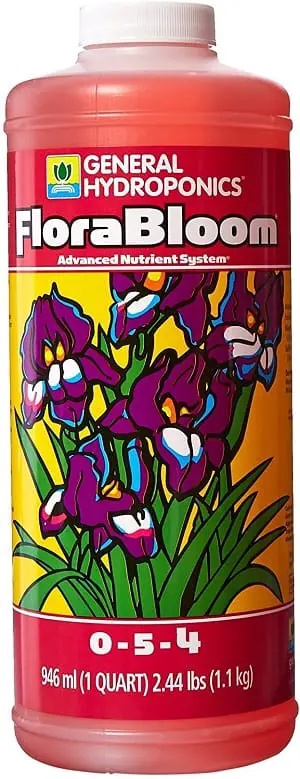
Product details
This hydronic is considered to be one of the most user-friendly hydroponics in the market. It’s easy to use and very convenient for the plants. It is available in three sizes. Quart, gallon, and 2.5 gallons.
The advantages of using FloraBloom
- Stimulates the flower and fruit development.
- Increases the level of potassium, Sulphur, and phosphorus which helps the plants.
- It has a positive result in increasing aroma and flavors.
- It’s very helpful to negotiate a comprehensive plant diet.
- This product has an Ideal proportion of primary and secondary micronutrients.
2. General Hydroponics Liquid KoolBloom
This product is used to promote intense flowering. This helps in bulking and ripening hydroponics. Flowering plants need extra nutrients to grow and to achieve bigger blooms. KoolBloom provides the essential nutrients for it.
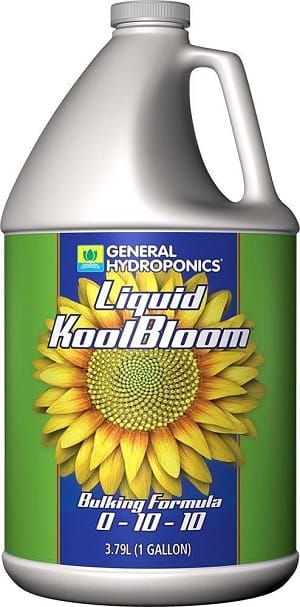
Liquid KoolBloom increases the necessary nutrients from root to buds and increases their intakes too. The quality of nutrition ensures that more of the buds will reach their flowering and fruiting state.
The concentrated formula of Liquid KoolBloom 0-10-10 can be used in hydroponics and even in soil too. It enhances the production rate of necessary oils and enzymes that helps a flower to blossom and live longer than the average age.
Use this supplement in the last two cycles of the plant. It benefits the plant with more phosphorus and Potassium.
3. MaxiGro
MaxiGro is also a plant food for outstanding growth and quality. MaxiGro has a wide range of varieties of plants. The advantages of these products are-
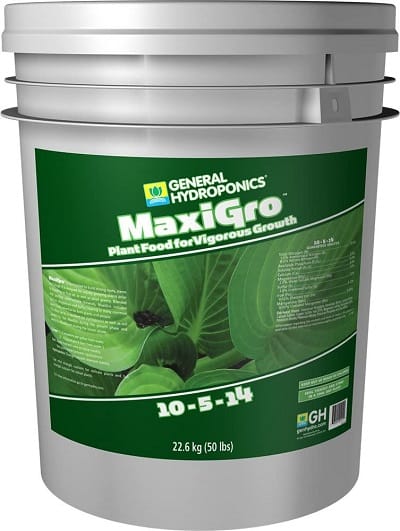
- It is a complete solution for primary, secondary, and micronutrients.
- It showed extraordinary results in different varieties of crops.
- It’s ideal for hydroponic plants.
- MaxiGro is a pH buffered solution. So, you won’t have to worry about the pH level of the solution.
Product details
This product comes in three quantities.
- 2.2 pound
- 16 pound
- 50 pound
4. HGC718125 FloraMicro 5-0-1
This is a very good general hydroponic which is used with FloraBloom and FloraGro. It is highly rated amongst gardeners because of its thickness, effectiveness, and results.
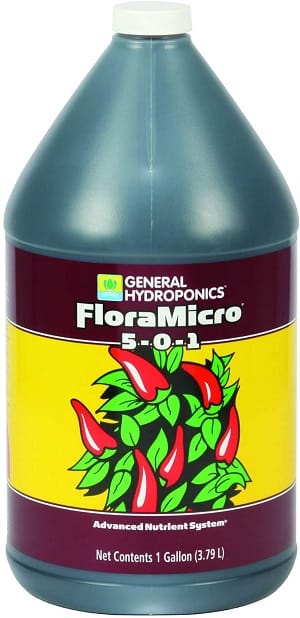
The advantages of using FloraMicro
- It’s very easy to use and make the solution with it.
- FloraMicro has a booster formula that helps hydroponics to grow more quickly.
- This component provides Nitrogen, Potassium, Calcium, and other important elements.
Product details
This product is only available in a 1 Gallon container solution.
5. pH Down Liquid Premium
This general hydroponics is used to control the pH level. It’s a product that helps you in buffering for pH stability. They use food-grade phosphoric acid to bring down the pH level of your plant.
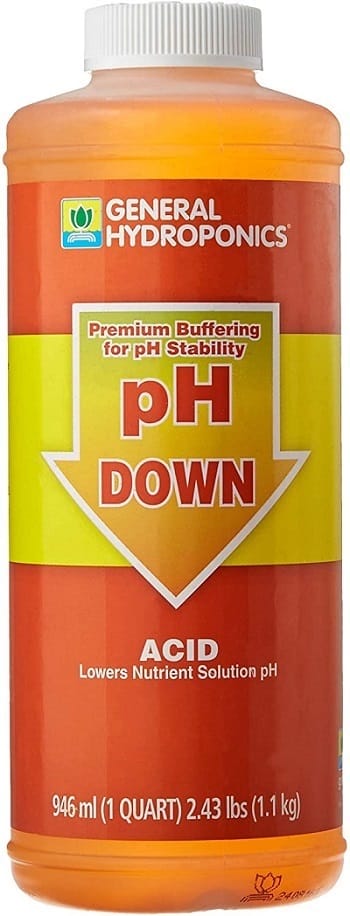
Why is it used?
To maximize the growth rate of your plant the pH level of your nutrients should be slightly acidic. Scientists say that the ideal pH level for plants is around 5.5-6.5.
Every hydroponic nutrient is pH buffered. But, sometimes due to the poor quality of supply water, the pH level tends to go high.
We often see that a high plant growth rate destabilize the mixture due to the rapid absorption of nutrients. For the above situation, you need to use a pH down the liquid to solve this.
Product details
This general hydroponic comes in two different varieties. One is for pH up and one is for pH down.
You can get them in a container of one gallon or one quart.
6. General Hydroponics HGC733525 CALiMAGic 1-0-0
This general hydroponics is a blend of Calcium and Magnesium. This helps the plant to prevent deficiencies that stop the blossoming of flowers. This also stops the tip burn from happening.
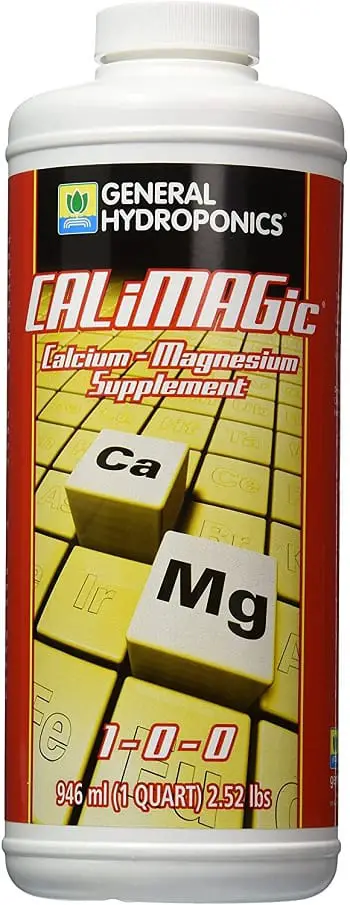
The advantages of CALiMAGic 1-0-0
- Calcium and Magnesium are necessary nutrients for plants. But, they don’t get them easily and their importance is often overlooked by the farmers.
- CALiMAGic prevents secondary nutrient deficiencies and helps the plants to make a strong structure.
- It can be used and combined with many other fertilizers.
- CALiMAGic helps prevent blossom end rot.
- It contains an NPK rate of 1-0-0
Product details
This product comes in three different sizes.
- 1-gallon container
- 6-gallon container
- 1 quart
7. Botanicare HGC732110 Cal-Mag Plus
This general hydroponics is a Magnesium, Calcium, and iron mixture that helps to fix common plant deficiencies. You can use it by mixing it with water and spraying it. Or supply it in the roots. Experienced gardeners suggest spraying it to get the maximum results.
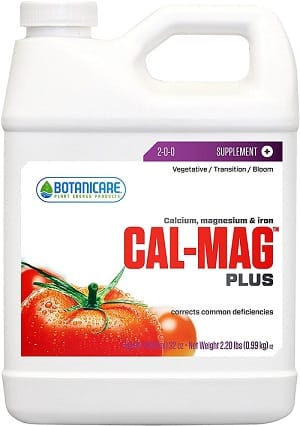
Product details
It is available in two different options.
The basics of plant nutrition
When we think of plants, the image that comes to our minds is one of a healthy green plant with lush leaves and an abundance of flowers. What’s not present in this picture are the nutrients that make all this possible. In fact, there are two kinds: primary and secondary.
Primary nutrients (nitrogen, phosphorus, potassium) supply basic needs for growth, while secondary ones (calcium, magnesium, etc.) help improve plant health and flower development. Plants get these nutrients from soil or water. The type they feed on depends on whether they’re growing in soil or hydroponically.
And today here we are talking about the hydroponic nutrient solution.
Guide to Hydroponic Nutrients
There are many different hydroponic nutrient brands on the market. With so many options available, it can be a little overwhelming to choose which one is right for you.
I’ve put together this detailed chart of Hydroponic Nutrient Brands so you can easily compare the side of your top choice by side.
If you need help or advice choosing the best one from the ones that we discussed earlier, let me tell you more about it.
Why do you need the best plant nutrients?
Hydroponics farming is not the same as traditional, in-ground farming. In this type of farming, a nutrient solution is used instead of soil.
This condition requires nutrients for plant growth and development, without which plants will either die or be very unhealthy, and they cannot yield optimal results.
How to select Best Hydroponic Nutrients?
You need to check the NPK values on the product label when you purchase plant nutrients.
It includes three numbers that indicate nitrogen (N), phosphorous (P), and potassium (K).
The first number shows the relative percentage of nitrogen in the mix; the second one shows phosphorous percent followed by potassium percentage respectively.
Nitrogen is responsible for vegetative growth while phosphorous helps in flowering and fruit development. Potassium is a must for the overall health, growth cycle, and yield of the plant.
What nutrients are best for hydroponics?
Plants need 17 nutrients for their nutrition.
You should meet all the nutrients to ensure the proper growth of your plants.
The essential elements for plants growth are
- Nitrogen (N)
- Potassium (K)
- Phosphorus (P)
- Manganese (Mn)
- Copper (Cu)
- Zinc (Zn)
- Molybdenum
- Boron (B)
- Chlorine (Cl)
- Calcium (Ca)
- Magnesium (Mg)
- Sulphur (S)
- Iron (Fe)
The levels of these nutrients differ to plant. There are also some elements that are necessary too.
They are nickel, cobalt, silica, etc. These nutrients are a must for plants. If their diet doesn’t consist of these nutrients then you’ll face deficiencies because of their lacking.
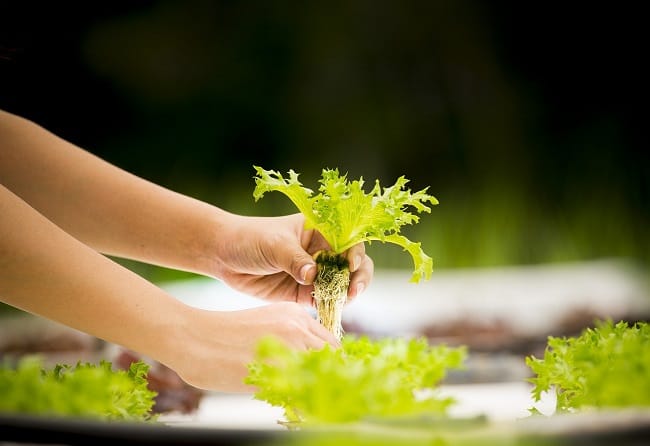
Mixing your nutrients
Before mixing the nutrients you should know some things. Here are some steps are given below-
- Check the preferred baseline of the water.
- Check the pH level and the ppm levels.
- Scientists and plant nutrient experts suggest using RO filtered water.
- The ideal level of nutrients depends on some variables like plant size, growth rate, environment, genetic diversity, and the light intensity of the plant’s surroundings.
- Use the nutrient calculator to decide the ideal level of the nutrients.
- Mix the solution thoroughly and regularly measure the pH level. The standard pH level for hydroponics is 5.5-6.2
- Don’t forget to dump your unused supplement after 7-10 days.
What is the NPK Ratio?
NPK ratio is a term that is often heard in plant nutrition. It refers to the ratio of Nitrogen (N), Phosphorus (P), and Potassium (K) in fertilizers. For example, suppose a fertilizer’s NPK ratio is 26-5-7, which means that the fertilizer consists of 26% nitrogen, 5% phosphorus, and 7% potassium.
This NPK ratio is important as plants need a large amount of nitrogen, potassium, phosphorus than any other nutrients they need. These three are often called to be the primary nutrients among 17 nutrients a plant need to survive.
Organic nutrients vs synthetic nutrients
There are two kinds of hydroponic nutrients based on their origin. One is synthetic hydroponic nutrients.
And the other is organic nutrients. Synthetic nutrients are made by humans for plant consumption.
On the other hand, organic nutrients are dependent on the microorganisms of the soil.
These microorganisms turn organic materials into an inorganic form that will be consumable for hydroponics.
But there is no difference in the final product of these two types of nutrients. An ion is an ion no matter how it’s created or how it was formulated.
As there are limitations in the solubility in organic components so it’s yet not possible to draw every nutrient from the organic way.
Dry Nutrients vs. Liquid Nutrients
When you decide to use nutrients to grow quality plants then you’ll come in a dilemma to choose your form of nutrients. There are two kinds of nutrients. They are-
- Liquid nutrients &
- Dry nutrients
See also Top 9 Best Garden Sprayers For Sale Reviews
These two types have their advantages and disadvantages. I’ll try to explain their pros and con’s so you can take your decision more precisely.
Liquid nutrients
Nowadays if you think of large-scale cultivation, liquid nutrients are the solution for you. Liquid fertilizers are very easy to distribute and apply on a larger scale.
Liquid nutrients are also concentrated than dry nutrients. As a result, they are comparatively more easy to mix in the water. Research shows that plants take liquid nutrients more quickly than dry nutrients. That is quite a large advantage I think!
Dry nutrients
Dry nutrients are also a popular solution among farmers. From the name you can know it is in a solid-state.
Dry nutrients are put on the soil. Dry nutrients are used when you want to avoid overfeeding your plants.
Because it’s applied in a dry medium, plants take more time to absorb it than in liquid form. They work slower and u can’t feed your plants often if you use dry nutrients.
Frequently Asked Questions
We often face some questions about hydroponic nutrients. So, we thought to categorize some of the frequently asked questions about hydroponic nutrients. Here are some of a few-
How do I check hydroponic nutrient levels?
Most hydroponic nutrient systems specify two important measurements: pH and EC. Nitrogen-bearing nutrients such as nitrogen, phosphorous, and potassium need to be present in the water solution in different concentrations than root benefits such as calcium, magnesium, and sulfur.
These malevolent minerals can interfere with the absorption of nitrates by plants when they remain in the root zone for extended periods of time.
The pH level indicates if sufficient acid is present whereas the EC level measures electrical conductivity which is a measurement of how well water conducts electricity to transmit an electric current or an ionic charge.
An increase in EC could lead to over cultivating your desired plant’s roots while neglecting them from obtaining adequate amounts of oxygen since they are bonded
Can I make my hydroponic nutrient solution?
If you use normal fertilizer for hydroponics you can make the nutrient solution at home. Firstly, purchase some water-soluble fertilizers like 20-20-20 and 24-8-16 and you are set to go! You can find these fertilizers in a garden supply store or any nursery.
But before making your nutrient solution you should know about the nutrients ratio and the differences between micro and macronutrients.
Can I use regular fertilizer for hydroponics?
Yes, you can use regular fertilizer for hydroponics. But, I don’t think that will be a wise thing to do. Regula fertilizers lack a lot of elements that are present in hydroponic nutrients.
This will hamper the abundant green growth in your hydroponics. Which may not be a good sight for you.
See also 10 Best Solar Water Pump for Your Garden (Buying Guide 2021)
Can you grow hydroponics without nutrients?
I’m afraid you can’t. Hydroponic is a type of horticulture that replaces soil with nutrient solutions. But, if you don’t provide these nutrient solutions then it will be impossible for the hydroponics to survive let alone grow. You should have to supply hydroponics with the necessary nutrients.
Why should you buy hydroponic nutrients in a package?
Hydroponic demands varieties of nutrients to produce quality crops. In normal soil-based farming, plants get their necessary nutrients from the soil. You just have to supply NPK and some other macronutrients to produce good plants.
But, here we are talking about hydroponics, you’ll have to ensure every bit of nutrients your plant need. Hydroponic nutrients are made of this idea that It’ll consist of every kind of nutrient that is necessary for hydroponics.
That’s why it’s a smart decision to buy hydroponic nutrients in a package. Because you won’t have to worry about the availability of every kind of nutrients.
How do plants get nutrients in a hydroponic system?
In a hydroponic system, plants need to get their nutrition from somewhere else. The hydroponic system uses water as a medium to get its nutrients. The nutrients are diluted in the water and it travels to the plant’s roots.
These nutrient mixtures are made keeping three stages in mind. Flower leaf and fruit. The expected product decides the type of nutrients that will be needed in those hydroponics.
Are Hydroponic Nutrients Safe?
Hydroponic nutrients are safe. In regular growing methods plants have to go through pesticides, chemicals, pathogens, and whatnot. But in the hydroponic system, you get to control the environment of the plants living in it.
Hydroponic nutrients ensure that your plants get their nutrition in this secured system. As long as you use hydroponic nutrients appropriately and know how to dispose of them when you need to, then you have nothing to worry about.
Conclusion
Becoming a gardener is a fun task to do! But knowing all these things and applying them to your plants and producing quality plants is a hard nut. I hope the products I reviewed may help you to set the diet plan for your plants.
After reading this you would have known about the 7 best hydroponic nutrients. However, we believe you may have a further interest in it.
To know more, you can leave a question for us in the comment box. We will try to reach you as soon as possible with an answer to your question.
Wish you a great day!
